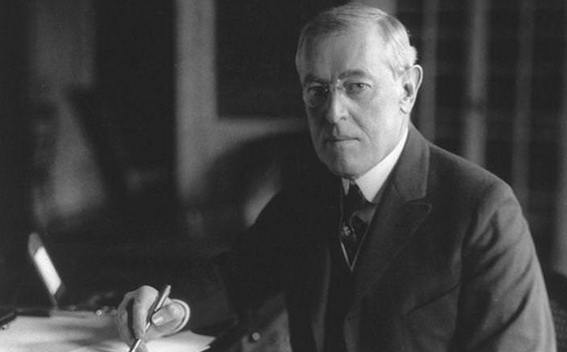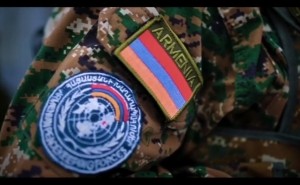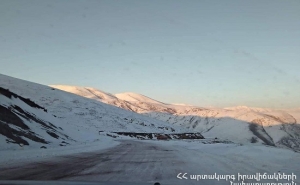November 22, 1920: Woodrow Wilson Gave his Arbitral Award on the Armenian-Turkish Border

On that August day in 1920, a solemn prayer was conducted in the Armenian Church in Paris, after which a formal audience took place in the Armenian delegation’s residence. In the words of Avetis Aharonyan, the head of the delegation, a vast number of Armenians had gathered to celebrate the great national day, on the occasion of the signing of the Treaty of Sèvres. Speeches and poems were recited and patriotic songs were sung "in honour of a Free, Independent, and United Armenia."
The Armenian newspaper Haraj wrote, "August 10 will remain a historic date in the world, and especially for Oriental history. After long vacillations and conspiracies, Turkey was forced to sign the peace treaty. Turkey is dismembered – Arabia, Palestine, Syria, Armenia, Kurdistan, and the region of Izmir are removed from its rule, and Constantinople and the straits from under its influence. This document is historic also because the treaty, Turkey’s death verdict, is signed by the government of Armenia."
From a report sent to the government of Armenia by Aharonyan: "On August 10, we reached Sèvres from Paris. Almost all the representatives of all the states were seated, when the Chairman of the Conference entered. Wearing the red fez on their heads, the three Turkish delegates entered, greeted the conference with a light movement of their heads, and took their seats above the Greeks.
The Chairman of the Conference stood up and said, ‘Gentlemen, I announce that this treaty which we will sign corresponds to that accepted by both sides.’ Then he invited the Turks to sign. Hamid Pasha, Riza Tevfik Bey, and Khalil Bey stood up and, with decisive steps, approached the table in the middle of the room and, with nervous movements, signed, one after the other. After that the representatives of Britain, France, Italy, and Japan signed and, immediately after them, they invited me."
According to the Treaty of Sèvres, the issues of deciding the border between Armenia and the Ottoman Empire in the vilayets of Erzurum (Karin), Trabizond, Van, and Bitlis and giving Armenia an outlet to the Black Sea were to be given as an arbitral award by the US President Woodrow Wilson, whose decision would be compulsory for the states that had signed the treaty. President Wilson gave his arbitral award on the Armenian-Turkish border on November 22, according to which the four vilayets, with a total territory of 87 thousand square kilometres, were included within Armenia, not counting the more than 20 thousand square kilometers of territory of the regions of Kars, Ardahan, and Surmalu, which were Armenia’s indisputable territories.
If the Treaty of Sèvres had been realised, the Republic of Armenia would have covered a territory of over 160 thousand square kilometres. However, not only did that treaty remain an unfulfilled Armenian dream but, about four months after the signing, as a result of the indifference of the Allied Powers and Kemalist-Bolshevik conspiring, the Republic of Armenia became Soviet Armenia, which, in a short period of time, lost its independence and became a part of the Soviet Union.
-
 17:08
17:08The regular session of the Anti-corruption Policy Council takes place in Jermuk
-
 15:05
15:05The Prime Minister sends congratulatory messages to the supreme leader of Iran and the President of Iran
-
 11:11
11:11Armenia sends earthquake aid to Turkey
-
 10:43
10:43Commemoration of the Pontiff St. Sahak Partev
-
 09:16
09:16Some roads are closed and difficult to pass in Armenia
-
 19:55
19:55Phone conversation of the Foreign Minister of Armenia with the U.S. Assistant Secretary of State for European and Eurasian Affairs
-
 18:30
18:30Prime Minister Pashinyan and President Khachaturyan meet
-
 18:20
18:20Ararat Mirzoyan with Co-Chairman of the OSCE Minsk Group of France Brice Roquefeuil
-
 17:01
17:01Humans could land on Mars within 10 years, Musk predicts
-
 16:45
16:45France, US urge 'immediate' end to Nagorno Karabakh blockade
-
 16:01
16:01Blockaded Nagorno Karabakh launches fundraiser to support quake-hit Syria
-
 15:59
15:59Earthquake death toll in Turkey rises to 18,342
-
 15:43
15:43Ararat Mirzoyan Held a Telephone Conversation with Sergey Lavrov
-
 15:06
15:06French president rules out fighter jet supplies to Ukraine in near future
-
 14:47
14:475 Day Weather Forecast in Armenia
-
 14:44
14:44President Vahagn Khachaturyan wrote a note in the book of condolences opened in the Embassy of Syria in Armenia
-
 14:20
14:20Azerbaijan’s provocations impede establishment of peace and stability – Armenian FM tells Russian Co-Chair of OSCE MG
-
 12:57
12:57France representation to OSCE: Paris calls on Azerbaijan to restore freedom of movement through Lachin corridor
-
 11:40
11:40Command of Kosovo forces highly appreciated preparation of Armenian peacekeepers
-
 10:16
10:16The United States withdrew from sanctions against Syria for six months the provision of assistance after the earthquake
day
week
month
Humidity: 54%
Wind: 1.54 km/h









